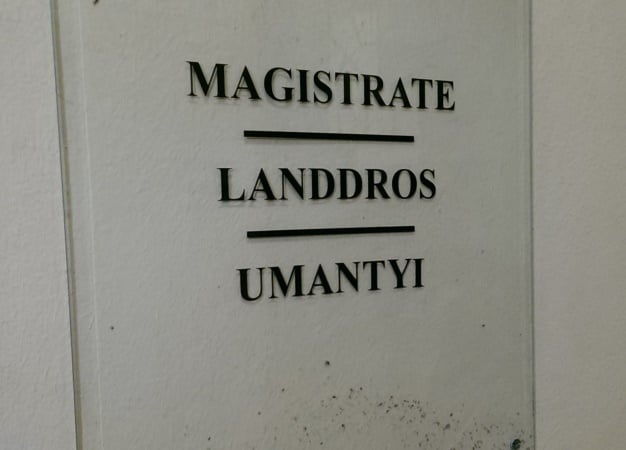
Magistrate's Court. (Duncan Alfreds, News24, file)
Multimedia · User Galleries · News in Pictures Send us your pictures · Send us your stories

Magistrate's Court. (Duncan Alfreds, News24, file)
Multimedia · User Galleries · News in Pictures Send us your pictures · Send us your stories

The claim that a magistrate could be on the take, or could have been captured, has to be considered one of the gravest allegations to emerge from the state capture inquiry so far, writes Mandy Wiener.
It was February 2014 and the country was gearing up for the much hyped Oscar Pistorius trial. Pretoria's Chief Magistrate Desmond Nair, who had achieved international recognition for his role in presiding over the bail application, granted me a rare interview in his office.
He spoke with great passion and conviction about the peculiarities and nuances of bail, about his career in the small KwaZulu-Natal town of Dundee and why he chose to go to the Bench, rather than the more lucrative option of private practice.
"I took to it immediately. I enjoyed it from day one and I found the interpretation, the application of the law, to be enjoyable. I was so dedicated," he told me, pointing at the shelves full of books lining his office walls. "Those law reports, behind you now, I would pick it up like a novel, just to read. And I would read them non-stop!" he exclaimed. He showed me a photograph, taken by a colleague, of himself as a young magistrate pouring over volumes of reports.
So when testimony emerged at the Zondo commission of inquiry into state capture that Nair may have accepted the installation of R200 000 worth of security systems at his home from controversial company Bosasa, I was shocked.
To be clear, it is the evidence of one Bosasa employee and Nair has not yet had an opportunity to respond to the allegations. He has appointed a criminal lawyer and the Magistrates Commission is considering the matter. We have to give Nair, a highly regarded judicial officer, the benefit of the doubt.
However, the claim that a magistrate could be on the take, or could have been captured, has to be considered one of the gravest allegations to emerge from the inquiry so far.
Amidst the claims of corruption involving Cabinet ministers, corrections officials and even prosecuting authority members, it is the bribing of a member of the Bench that should alarm us most. It is a breach of the final defence against the onslaught of state capture. The judiciary is the bulwark, ensuring our constitutional democracy is preserved and law and order are maintained.
It is the hallowed institution which checks the abuse of power and is the final arbiter to resolve disagreements, to protect human rights and to essentially, keep society from falling apart. Over the past decade, as our law enforcement agencies and various facets of government have been under threat, our judiciary has stood firm.
Buoyed by a vigorous civil society that has pursued legal recourse, the country's courts have repeatedly ruled on contentious issues without fear or favour. An illustration of this is the Omar al-Bashir matter, the Nkandla court case involving the public protector's powers and also around the appointments of Menzi Simelane and Shaun Abrahams as NDPPs.
The Constitutional Court is held in the highest esteem and just last week Chief Justice Mogoeng Mogoeng warned his colleagues against being captured, saying he is "not in the judiciary to be a celebrity". Rather, he is there to "make very unpopular decisions" and he is unphased by criticisms of his judgments.
However, it would be naïve to think that judges or magistrates are beyond the reach of capture. They are humans and are fallible. The prospect of a crooked judge is hardly a new concept. It's the plot of a John Grisham novel. It's the stuff of mafia lore. It's also a reality.
In October last year, Justice Minister Michael Masutha suspended KwaZulu-Natal regional court president Eric Nzimande. He faces a litany of charges including allegations that he accepted payments in return for appointing attorneys as acting magistrates. He also faces allegations of sexually harassing and demanding payments from a female attorney he appointed to serve as an acting magistrate.
According to an amaBhungane report, it was even suggested that he enabled – directly or indirectly – the formation of a network of judicial officers who were allegedly using their position to pervert justice on behalf of criminals. Then, in November last year, a magistrate from Carletonville was arrested for allegedly demanding a bribe from two female suspects who were arrested for theft.
The most infamous allegation of corruption and the judiciary has to be that involving Western Cape High Court Judge President John Hlophe. A complaint was laid by the full Bench of the Constitutional Court, alleging that Hlophe had approached Justice Bess Nkabinde and Justice Christopher Jafta and attempted to improperly influence them in a matter before the court involving Jacob Zuma.
On the whole, the country's judiciary remains largely impenetrable. According to the World Justice Project's Rule of Law Index, South Africa rates relatively well with a global ranking of 44 out of 113 with a low rate of corruption. But we need to ensure that our magistrates and judges maintain the integrity and legitimacy of their offices.
It would be naïve to believe that the capturers of Cabinet ministers and government officials would not have the arrogance and means to attempt to cast a net over the judiciary too.
And when that happens, the center will not hold.
- Wiener is a specialist reporter for News24.
Disclaimer: News24 encourages freedom of speech and the expression of diverse views. The views of columnists published on News24 are therefore their own and do not necessarily represent the views of News24.